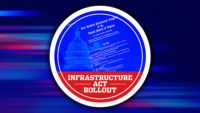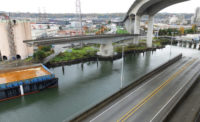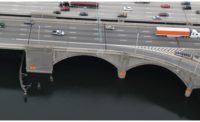The U.S. Dept. of Transportation has selected 162 projects across a variety of infrastructure modes to share $2.2 billion in federal grants, in the latest of its many funding announcements related to the Infrastructure Investment and Jobs Act (IIJA).
The awards, which U.S. DOT announced on June 28, come from the Rebuilding American Infrastructure with Sustainability and Equity (RAISE) program. The program was created in 2009, pre-dating the 2021 IIJA by more than a decade.
But the IIJA did give RAISE a 50% boost, to $1.5 billion a year from the $1 billion authorized for the program in fiscal year 2021. RAISE is authorized for five years.
For 2023, Congress also provided $775 million for RAISE in regular DOT appropriations, bringing the total available for this round to more than $2.2 billion.
In a June 27 Zoom video call with reporters, Mitch Landrieu, the White House infrastructure coordinator, said the projects funded by the latest group of RAISE grants “will make our transportation systems safer, more accessible and more sustainable.”
Landrieu also said that the new batch of grants is split evenly between rural and urban projects.
DOT Secretary Pete Buttigieg said in the briefing that the selected projects are in all 50 states, as well as the District of Columbia, Puerto Rico and the Northern Mariana Islands.
Buttigieg also said about 70% of the projects are located in low-income or underserved areas, which, he noted “is a high-water mark in the history of the program.”
As with earlier rounds of RAISE and other DOT discretionary grants, competition for the latest round of RAISE dollars was considerable. “We got even more applications this year than last year,” Buttigieg said, adding that applicants sought about $15 billion though only $2.2 billion was available.
Funding Breakdown by Transport Mode
Christopher Coes, DOT assistant secretary for policy, said that for this year’s RAISE capital grants, roadway projects received the largest share of the total funds awarded, with about $1.1 billion.
Bicycle and pedestrian projects received $508 million and transit proposals were awarded $324 million.
Among other sectors, rail capital project grants totaled $78 million; aviation received $23 million; and $9 million went to maritime projects.
Coes also pointed out that of the $1.1 billion for roadway projects, about $720 million was for "complete streets" projects, which seek to be designed for safety and mobility of all users, including motorists, pedestrians, bicyclists and transit riders.
RAISE was created in the 2009 recovery act and at first was named the Transportation Investment Generating Economic Recovery, or TIGER program. When the Trump administration came into office, it renamed the program Better Utilizing Investments to Leverage Development, or BUILD. The Biden administration changed the program’s name again, to RAISE, reflecting its policy priorities.Beth Osborne, director of advocacy group Transportation for America–who managed the program when it was named TIGER–notes that in the TIGER years, DOT often funded highway projects in the program.
Osborne says of the new RAISE grant round, "It's not whether or not the funding goes to roads. It's whether or not it goes to well-designed roads that serve all users and people of all income levels and backgrounds."
Congressional lawmakers from both parties hailed RAISE awards for projects in their districts or states. For example, Rep. Cathy McMorris Rodgers (R-Wash.) praised a $22.8-million RAISE grant for an overpass interchange at Spokane Regional Airport. She said, "This grant was years in the making and will have a tremendous impact on Eastern Washington communities."
New Hampshire's all-Democrat congressional Delegation, including Sens. Jeanne Shaheen and Maggie Hassan, welcomed a $20-million grant to help finance replacing of the General Sullivan Bridge in Rockingham and Strafford Counties with a new superstructure that would reopen a path across a bay that is a connection between Newington and Dover.
Story updated on 6/29/2023 with comments from congressional lawmakers and Transportation for America.






Post a comment to this article
Report Abusive Comment